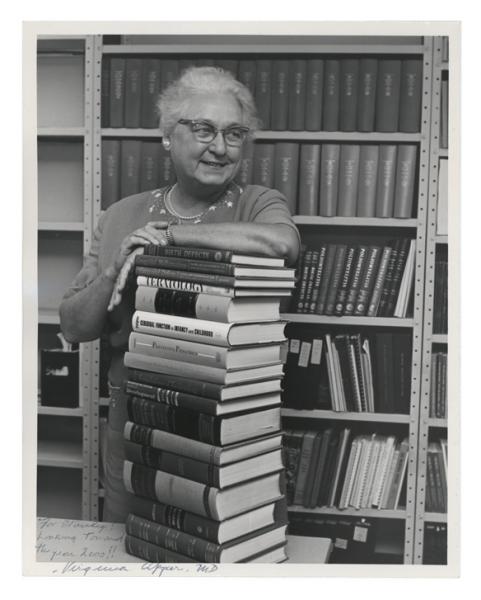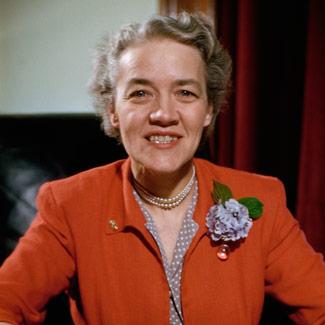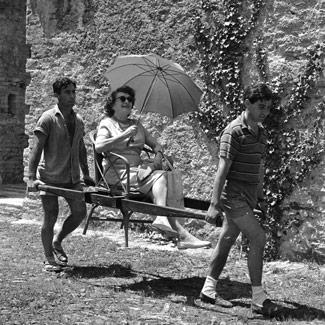 Virginia Apgar (7 June 1909– 7 August 1974) was an American physician who specialised in anesthesia. She was a leader in the fields of anesthesiology and teratology, and effectively founded the field of neonatology.
Virginia Apgar (7 June 1909– 7 August 1974) was an American physician who specialised in anesthesia. She was a leader in the fields of anesthesiology and teratology, and effectively founded the field of neonatology.
To the public, however, she is best known as the developer of the Apgar test, a method of assessing the health of newborn babies that has drastically reduced infant mortality over the world.
She graduated from Mount Holyoke College College of Physicians and Surgeons Columbia 1929, and the Columbia University College of Physicians & Surgeons in 1933.
She completed a residency in surgery at Columbia in 1937. However, she was discouraged from practicing surgery by Dr. Allen Whipple, the chair of surgery at Columbia. She further trained in anesthesia and returned to Columbia in 1938 as director of the newly formed division of anesthesia.
2010-09-13
Posted in Profiles & Bios
 Margaret Chase Smith (December 14, 1897 – May 29, 1995) was a Republican Senator from Maine, and one of the most successful politicians in Maine history. She was the first woman to be elected to both the U.S. House and the Senate, and the first woman from Maine to serve in either.
Margaret Chase Smith (December 14, 1897 – May 29, 1995) was a Republican Senator from Maine, and one of the most successful politicians in Maine history. She was the first woman to be elected to both the U.S. House and the Senate, and the first woman from Maine to serve in either.
She was also the first woman to have her name placed in nomination for the U.S. Presidency at a major party's convention (1964 Republican Convention, won by Barry Goldwater).
She was a moderate Republican, included with those known as Rockefeller Republicans. When she left office, Smith had the record as the longest-serving female senator in United States history, ranking 11th in seniority among the members of the Senate, a distinction that has not been surpassed.
2010-09-13
Posted in Profiles & Bios
 Geraldine Anne Ferraro (born August 26, 1935) is an American attorney, a Democratic Party politician and a former member of the United States House of Representatives. She was the first female Vice Presidential candidate representing a major American political party.
Geraldine Anne Ferraro (born August 26, 1935) is an American attorney, a Democratic Party politician and a former member of the United States House of Representatives. She was the first female Vice Presidential candidate representing a major American political party.
Ferraro grew up in New York and became a teacher and lawyer. She joined the Queens County District Attorney's Office in 1974, where she headed the new Special Victims Bureau that dealt with sex crimes, child abuse, and domestic violence. She was elected to Congress in 1978, where she rose rapidly in the party hierarchy while focusing on legislation to bring equity for women in the areas of wages, pensions, and retirement plans.
2010-09-13
Posted in Profiles & Bios
 Shirley Anita St. Hill Chisholm (November 30, 1924 – January 1, 2005) was an American politician, educator, and author. She was a Congresswoman, representing New York's 12th Congressional District for seven terms from 1969 to 1983. In 1968, she became the first black woman elected to Congress. On January 25, 1972, she became the first major-party black candidate for President of the United States and the first woman to run for the Democratic presidential nomination (Margaret Chase Smith had previously run for the Republican presidential nomination). She received 152 first-ballot votes at the 1972 Democratic National Convention.
Shirley Anita St. Hill Chisholm (November 30, 1924 – January 1, 2005) was an American politician, educator, and author. She was a Congresswoman, representing New York's 12th Congressional District for seven terms from 1969 to 1983. In 1968, she became the first black woman elected to Congress. On January 25, 1972, she became the first major-party black candidate for President of the United States and the first woman to run for the Democratic presidential nomination (Margaret Chase Smith had previously run for the Republican presidential nomination). She received 152 first-ballot votes at the 1972 Democratic National Convention.
Shirley Anita St. Hill was born in Brooklyn, New York, of immigrant parents. Her father, Charles Christopher St. Hill, was born in British Guiana and arrived in the United States via Antilla, Cuba, on April 10, 1923 aboard the S.S. Munamar in New York City. Her mother, Ruby Seale, was born in Christ Church, Barbados, and arrived in New York City aboard the S.S. Pocone on March 8, 1921.
2010-09-10
Posted in Profiles & Bios
 Caresse Crosby (April 20, 1892 - January 26, 1970), born Mary Phelps Jacob, was a patron of the arts, poet, publisher, and peace activist. She took on the name Polly in childhood. Her parents William Hearns Jacob and Mary Phelps were both descended from American colonial families, William from the Van Renssalear family and Mary from William Phelps.
Caresse Crosby (April 20, 1892 - January 26, 1970), born Mary Phelps Jacob, was a patron of the arts, poet, publisher, and peace activist. She took on the name Polly in childhood. Her parents William Hearns Jacob and Mary Phelps were both descended from American colonial families, William from the Van Renssalear family and Mary from William Phelps.
At age 19, she invented the first modern brassiere to receive a patent and gain wide acceptance. Her life at first followed convention. In 1915, she married the well-to-do Richard R. Peabody, whose family had arrived in New Hampshire in 1635. They had two children, but following Richard's service in World War I, Richard turned into a drunk who loved to watch buildings burn. Polly met Harry Crosby at a picnic in 1920 and they had sex within two weeks. Their public relationship scandalized proper blue blood Boston society.
2010-09-10
Posted in Profiles & Bios
 Virginia Apgar (7 June 1909– 7 August 1974) was an American physician who specialised in anesthesia. She was a leader in the fields of anesthesiology and teratology, and effectively founded the field of neonatology.
Virginia Apgar (7 June 1909– 7 August 1974) was an American physician who specialised in anesthesia. She was a leader in the fields of anesthesiology and teratology, and effectively founded the field of neonatology. Margaret Chase Smith (December 14, 1897 – May 29, 1995) was a Republican Senator from Maine, and one of the most successful politicians in Maine history. She was the first woman to be elected to both the U.S. House and the Senate, and the first woman from Maine to serve in either.
Margaret Chase Smith (December 14, 1897 – May 29, 1995) was a Republican Senator from Maine, and one of the most successful politicians in Maine history. She was the first woman to be elected to both the U.S. House and the Senate, and the first woman from Maine to serve in either. Geraldine Anne Ferraro (born August 26, 1935) is an American attorney, a Democratic Party politician and a former member of the United States House of Representatives. She was the first female Vice Presidential candidate representing a major American political party.
Geraldine Anne Ferraro (born August 26, 1935) is an American attorney, a Democratic Party politician and a former member of the United States House of Representatives. She was the first female Vice Presidential candidate representing a major American political party. Shirley Anita St. Hill Chisholm (November 30, 1924 – January 1, 2005) was an American politician, educator, and author. She was a Congresswoman, representing New York's 12th Congressional District for seven terms from 1969 to 1983. In 1968, she became the first black woman elected to Congress. On January 25, 1972, she became the first major-party black candidate for President of the United States and the first woman to run for the Democratic presidential nomination (Margaret Chase Smith had previously run for the Republican presidential nomination). She received 152 first-ballot votes at the 1972 Democratic National Convention.
Shirley Anita St. Hill Chisholm (November 30, 1924 – January 1, 2005) was an American politician, educator, and author. She was a Congresswoman, representing New York's 12th Congressional District for seven terms from 1969 to 1983. In 1968, she became the first black woman elected to Congress. On January 25, 1972, she became the first major-party black candidate for President of the United States and the first woman to run for the Democratic presidential nomination (Margaret Chase Smith had previously run for the Republican presidential nomination). She received 152 first-ballot votes at the 1972 Democratic National Convention. Caresse Crosby (April 20, 1892 - January 26, 1970), born Mary Phelps Jacob, was a patron of the arts, poet, publisher, and peace activist. She took on the name Polly in childhood. Her parents William Hearns Jacob and Mary Phelps were both descended from American colonial families, William from the Van Renssalear family and Mary from William Phelps.
Caresse Crosby (April 20, 1892 - January 26, 1970), born Mary Phelps Jacob, was a patron of the arts, poet, publisher, and peace activist. She took on the name Polly in childhood. Her parents William Hearns Jacob and Mary Phelps were both descended from American colonial families, William from the Van Renssalear family and Mary from William Phelps.